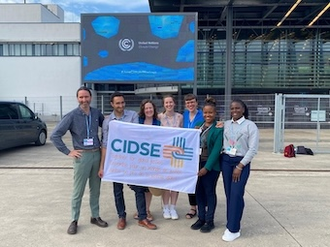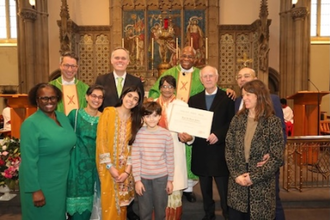From Bonn to Belem: Where's the Justice in Climate Action?

CIDSE team in Bonn
As the UNFCCC intersessionals (SB62) in Bonn wrap up, CIDSE - the international family of Catholic social justice organisations - says governments are still falling short of the bold action needed to confront the climate crisis. Held during the 10th anniversaries of both Laudato Si' and the Paris Agreement, the talks represented a crucial moment to push ahead with justice-centred climate solutions. But CIDSE warns: the pace of work is still too slow, and ambition far too small.
Climate Finance and Debt Cancellation:
CIDSE is concerned that once again, the most vulnerable countries were left waiting for clear pathways forward towards Belém. Discussions majored in scaling up private sector support, but lacked the urgency and clarity needed on providing public money.
"This Jubilee Year, developing countries desperately need debt relief. If we are to have a hope of keeping 1.5°C alive, industrialised countries must finally get serious about providing the public, accessible finance they owe. Instead, developing countries are drowning in unfair debt. There can be no climate justice without debt justice; the Baku to Belém Roadmap to $1.3T process must put grant-based finance and alleviating international debt distress at its heart", said Liz Cronin, CAFOD's Climate Change Policy Lead.
"The 5th iteration of the Sharm El-Sheikh Dialogues on aligning all financial flows with a pathway towards low greenhouse gas emissions and climate-resilient development - the so-called Article 2.1c of the Paris Agreement - was again very much focused on mobilising private finance and limited instruments like insurance schemes. However, central questions remain: How to steer private and public finance away from investments into fossil fuels? How to provide higher quality finance for adaptation? How to address loss and damage in vulnerable countries by consistently applying the polluter pays principle in fiscal policy? Those were not sufficiently addressed throughout the many days of exchange. A strong follow-up process of the dialogues to address those questions is needed from COP30", commented Martin Krenn, Advocacy Officer at KOO.
Especially as we are in the Jubilee Year of Hope, we need more ambitious measures to tackle the entwined, systemic crises of debt and climate change.
NDC Ambition and Global Stocktake:
Many governments spoke of "raising ambition," but few have delivered so far. Parties are expected to submit national climate plans, the Nationally Determined Contributions (NDCs), that align with the 1.5°C target and these must reflect key outcomes of the first Global Stocktake decision in Dubai to phase out fossil fuels, expand renewable energy sources and stop deforestation.
"For the world to respond to the climate crisis we need all countries to intensify their domestic climate action. And we need rich countries to deliver the needed climate finance. For this to happen all countries must deliver strong and balanced NDCs. But so far only a bit more than twenty NDCs have been published. We expected the Bonn climate conference to bring the urgency of climate action to the forefront of political attention. This has not happened - countries have not even agreed to discuss NDCs intensively at COP30 and to assess whether the world is collectively on track. This has to change. We ask political leaders to turn their attention to the climate crisis and work out strong NDCs that are aligned with people's needs", said David Knecht, Programme Manager for Energy & Climate Justice at Fastenaktion.
"While parties are working on implementing the last Global Stocktake, they are already shaping what the next one will look like. Some Parties have highlighted how important a strong scientific basis is to assess global efforts towards the Paris goal and want to make sure the IPCC reports can be included. Others have attacked the legitimacy of the Intergovernmental Panel on Climate Change. It is vital that political leaders make sure that the IPCC can fulfil its role within the Global Stocktake process", added Bettina Duerr, Programme Manager for Climate Justice at Fastenaktion.
Just Transition:
CIDSE pushed for texts that put workers, Indigenous Peoples, women, and local communities at the centre.
"SB62 helped clarify diverse perspectives on implementing a globally just energy transition. It highlighted the need to better connect UN-level Just Transition talks with national action. Key ideas included Just Transition plans in NDC, fair financing, including debt relief and polluter taxes and a global mechanism", said Madeleine Wörner, Expert for Renewable Energies and Energy Policy at Misereor.
"After many decades of intense research and lived experiences on the ground, Parties are still grappling with the meaning and application of equity and justice in this critical decade of climate ambition and action. The main battle is about when and how we transform the global economy and society together towards a low carbon one in a manner that is socially just, and in line with 1.5°C, without leaving no one behind. When engaging in meaningful dialogue, we must not be afraid to ask who will be left behind, and how to stay aboard and thrive. Globally speaking, it will be those who are vulnerable to worsening climate impacts and those living in increasing poverty and inequality in society. We have a moral duty to put an end to their perennial suffering and deliver a meaningful and impactful outcome at COP30. In the same socially just manner and spirit, Parties must deliver a functional and actionable just transition work programme that serves the global, regional and sub-regional communities beyond dialogues", stated Lydia Machaka, CIDSE Energy and Extractivism Policy Officer.
"There was little progress on Loss and Damage, and many key decisions will be put off until COP30. The negotiations saw escalated evasion tactics by the Global North to delay and divert Loss and Damage talks, in an effort to avoid paying up what they owe for the climate damages they have caused. Now looking ahead to COP30 it is clear that we need two things. First, we need honesty and certainty about the scale of the Loss and Damage already experienced around the world, via a "State of Loss and Damage Report" and guidelines on Loss and Damage in NDCs. Second, we need a massive increase in the amount of grant-based finance provided to the Fund for Responding to Loss and Damage (FRLD). If rich countries arrive at COP30 unwilling to budge on these issues, this could have a devastating impact on the overall progress of the talks and hurt chances of a successful outcome at COP30 in many other key areas", added Ben Wilson Director of Public Engagement for SCIAF on Loss and Damage.
Food Systems and Agriculture:
Despite growing recognition of the need to transform food systems, negotiations remained stuck in outdated models.
"The first Sharm El-Sheikh Joint work programme workshop took place focusing on agriculture and food security. It was highlighted that the global food system generates one third of the world's emissions. It was also clear that agroecology offers the best way forward to address the impacts of climate change today and in the years to come. However, there are huge vested interests pushing their vision of agriculture which would benefit big agri-business companies that seek to disguise themselves as proponents of 'sustainable agriculture'. COP30 has to send a clear signal: the world is pivoting away from the old industrial model of agriculture - which is driving up emissions and not addressing global hunger - to a model that enables smallholder farmers to prosper, provide food and protect the planet", added Anne Callaghan, Advocacy and Campaigns Officer at SCIAF.
"The Sharm El-Sheikh Joint Work Programme workshop discussions on the implementation of climate action on agriculture and food security portrayed increased recognition of agroecology in shaping the future of agriculture and climate action, particularly in regions like Africa, where climate vulnerability is high and industrial farming systems have failed to deliver resilience or sustainability. It is therefore imperative for parties and international organisations to note that the implementation of agroecology and the adoption of a food systems approach to implementing climate action related to agriculture and food security is essential and urgent", commented Simon Bukenya, Programme Officer, Climate Change and Agroecology, AFSA.
With just five months to go until COP30 in Belém, CIDSE urges political leaders to stop delaying and start delivering. This is a moment for courage, not caution.
Read about CIDSE's work at SB62 HERE.
CIDSE is an international family of Catholic social justice organisations. We work with global partners and allies to promote justice, harnessing the power of global solidarity to achieve transformational change for people and the planet. We challenge systemic injustice and its destructive impacts through connecting, mobilising, influencing and telling stories of change. We promote environmentally and socially just alternatives to allow everyone to thrive in our common home.
Our members are: Broederlijk Delen (Belgium), CAFOD (England and Wales), CCFD-Terre Solidaire (France), Cordaid (the Netherlands), Development & Peace (Canada), Entraide et Fraternité (Belgium), eRko (Slovakia), Fastenaktion (Switzerland), FEC (Portugal), FOCSIV (Italy), Partage Lu (Luxembourg), KOO (Austria), Manos Unidas (Spain), Maryknoll Office for Global Concerns (USA), Misereor (Germany), SCIAF (Scotland), Trócaire (Ireland), Vastenactie (the Netherlands).


















